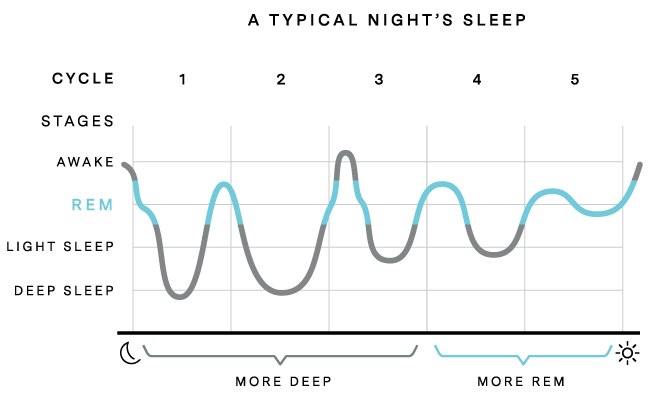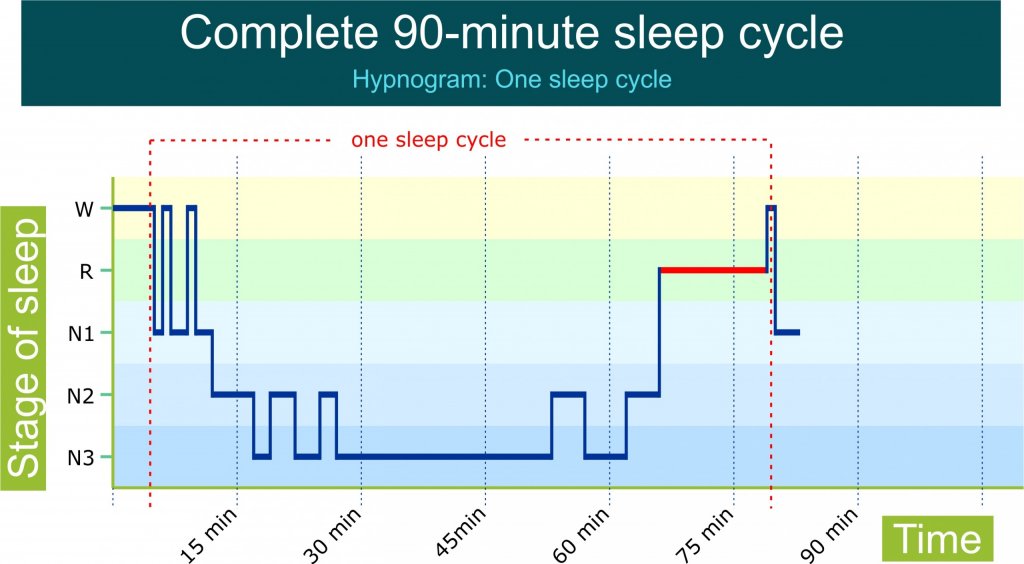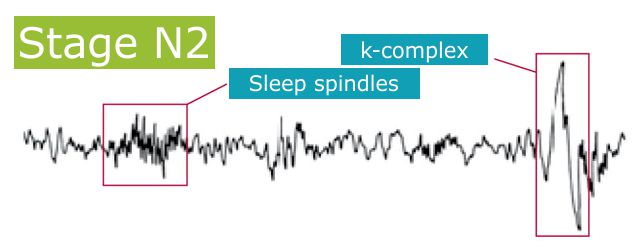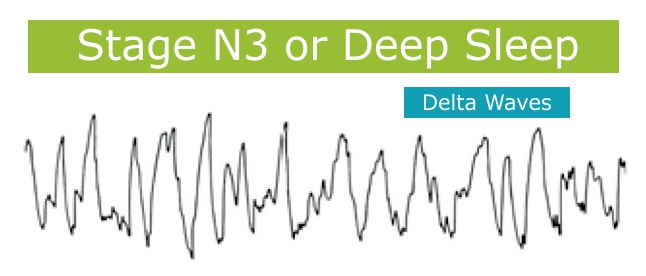Sleep experts recommend sleeping between seven to nine hours every night (for average healthy adults), but have you ever wondered why? Why is sleeping less than seven hours so bad for your health? The answer has to do with the science of sleep and the way we experience sleep in what are called sleep stages and sleep cycles.
In this article, you’ll learn all about sleep stages and sleep cycles, which will help explain why sleep experts recommend between seven and nine hours each night. Then, you’ll learn more about the various sleep stages including the benefits that each specific stage can bring you. Finally, you’ll learn how to take care of your sleep cycle so you can experience all of the wonderful benefits of each stage of sleep. By the end of this article, you might just be convinced that improving your sleep is one of the best ways to improve your life.
The Science of Sleep - Understanding Sleep Stages and Sleep Cycles
In order to understand why we sleep and the importance of sleeping seven to nine hours, we need to understand what happens to the mind and body when we sleep. Here’s the simple answer:
From the moment we drift off into sleep until we reawaken the following morning, our body and mind are cycling through four stages of sleep in approximately 90-minute sleep cycles.
- Stage 1: Light Non-REM Sleep (falling asleep)
- Stage 2: Light Non-REM Sleep
- Stage 3: Deep Non-REM Sleep
- REM Sleep (dream sleep)
We experience Stage 1 Light Non-REM Sleep for a couple of minutes right as we’re falling asleep. Then we cycle from Stage 2 to Stage 3, back to Stage 2, and finally experience our first episode of REM Sleep about 90 minutes after falling asleep.
The image below demonstrates one complete 90-minute sleep cycle.
Each stage of sleep has specific restorative qualities that are important for our health and the optimal functioning of our mind and body. Sleep experts say that we need to experience about five to six sleep cycles per night in order to reap the benefits of each sleep stage.
It seems simple enough: If we do the math (and account for the fact that some people have longer or shorter sleep cycles than others), five to six sleep cycles equals about seven to nine hours. That means, if we’re sleeping for seven to nine hours, we’re experiencing the five to six sleep cycles that experts recommend. If we’re only sleeping for five to six hours, however, we’re probably only completing about three to four cycles of sleep.
So, what’s so bad about missing out on our last few sleep cycles? Are the last few sleep cycles really that important?
Yes, they are! But, here’s where it gets complicated…
We don’t experience all of the sleep stages evenly throughout the night. Some sleep stages are more prominent in our earlier sleep cycles while others don’t really show up until our last few sleep cycles. We get most of our deep sleep in our first two sleep cycles, for example, and don’t get much light sleep or REM sleep until cycles four, five, and six.
That means, if we’re sleeping only five to six hours, we’re not cutting back on each sleep stage evenly. On the contrary, we’re almost entirely cutting out certain sleep stages.
The image below demonstrates how the first couple of sleep cycles we experience tend to contain more deep sleep, while the last few sleep cycles tend to be rich with REM.

Furthermore, our 90-minute sleep cycles are quite fragile. It doesn’t take much to throw off the delicate balance of sleep stages in our sleep cycles and cause severe deprivation of one or more sleep stages.
We’ll talk more about how certain lifestyle choices and unhealthy habits can impact sleep cycles in the next section. For now, let’s take a look at the functions and benefits of each stage of sleep.
Exploring the Functions and Benefits of Each Sleep Stage
When we sleep, we cycle through four different stages of sleep which can be grouped into two basic types of sleep: Rapid Eye Movement (REM) sleep (dream sleep) and Non-REM sleep (non-dream sleep which represents Stages 1 through 3).
Each stage serves a specific function for our brain and body and provides us with a unique set of benefits. If we want to reap all of the incredible benefits of a good night’s sleep and avoid the fatal consequences of sleep deprivation, we need to experience an adequate amount of each stage of sleep, which means we need to complete between five and six sleep cycles. Or, in other words, we need to sleep between seven and nine hours each night.
Stage 1: Light Non-REM Sleep (falling asleep)
Stage 1 Non-REM sleep is the kind of sleep we experience as we’re falling asleep and we gradually begin to lose awareness of our surroundings. Sleep Stage 1 only lasts a couple of minutes and serves mostly as a transition stage. The real magic doesn’t happen until Stage 2.
The Biology of Stage 1 Light Non-REM Sleep
During Stage 1, our heartbeat, breathing, and eye movements slow down, and our muscles start to relax. They may twitch occasionally. Our brain waves also begin to slow and transition from daytime wakefulness patterns to light Non-REM sleep patterns.
Stage 2: Light Non-REM Sleep
Stage 2 Non-REM sleep is a period of light sleep we experience as we transition from the very light sleep we experience in Stage 1 Non-REM to the deepest sleep we experience in Stage 3 Non-REM. It’s also the type of sleep we experience when we transition back and forth between deep Stage 3 Non-REM sleep and REM sleep. Since Stage 2 is necessary for transitioning between sleep stages, we experience more Stage 2 sleep than any other stage. We get most of our Stage 2 light sleep during our last few sleep cycles.
The Biology of Stage 2 Light Non-REM Sleep
During Stage 2, our heartbeat and breathing slow down even more, and our muscles relax even further. Our body temperature drops and eye movements stop. Brain wave activity slows down as well but still contains brief bursts of electrical activity in the form of sleep spindles and K-complexes.
Functions and benefits of Stage 2 Light Non-REM Sleep
Helps us create new memories. Sleep spindles in light Non-REM sleep help transfer memories from short-term memory storage to long-term memory storage, creating more room in our short-term memory to learn new things and create new memories. [1]https://www.cell.com/current-biology/fulltext/S0960-9822(11)00042-X
Helps us remember information and facts. Sleep spindle activity increases the night after learning new information and facts which suggests that sleep spindles in light Non-REM sleep play a part in strengthening our memory of facts and information. [2]https://www.ncbi.nlm.nih.gov/pmc/articles/PMC2542961/
Helps us with sports, instruments, and other motor activities. After practicing a sport or instrument, sleep spindle activity increases right around the motor cortex, which suggests that light Non-REM sleep plays a part in solidifying motor memories. Likewise, the more sleep spindles we experience around our motor cortex the night after practicing a sport or instrument, the better we perform the following day. [3]https://www.ncbi.nlm.nih.gov/pmc/articles/PMC2542961/
Helps us identify complex patterns and relationships, a key skill in logic and problem-solving. Individuals who are better at identifying complex patterns and relationships experience sleep spindle activity in the parietal region of their brains during light Non-REM sleep, [4]https://pubmed.ncbi.nlm.nih.gov/30787863/ which suggests that light Non-REM sleep plays a part in developing our cognitive abilities and intelligence.
Stage 3: Deep Non-REM Sleep
Stage 3 Deep Non-REM sleep is the deepest sleep stage we experience and is often considered the most restorative. We get most of the deep Non-REM sleep that we need in the first half of the night.
The Biology of Stage 3 Deep Non-REM Sleep
During Stage 3 Deep Non-REM sleep, our brain waves slow down significantly, which is why this stage of sleep is often referred to as slow wave sleep (SWS). In addition, our breathing and heartbeat slow down, and our pulse beats about 20% to 30% slower than it does while we’re awake (one of the reasons why sleep lowers our risk of heart disease). During this stage, we become almost completely unresponsive to external stimuli, making it very difficult to wake up.
Functions and benefits of Stage 3 Deep Non-REM Sleep
- Helps to keep us physically healthy and strong. The Growth Hormone (GH) released during deep Non-REM sleep does more than just help children and adolescents grow into healthy adults. GH helps to restore and rebuild our bones, tissues, and muscles and also works to promote a healthy metabolism. Too little GH can lead to a reduced sense of wellbeing, increased fat, an increased risk of diabetes, an increased risk of heart disease, a weak heart, and weak muscles and bones. [5]https://www.yourhormones.info/hormones/growth-hormone/
- Helps us remember information and facts. It’s not only light Non-REM sleep that’s responsible for strengthening our declarative memory. Deep Non-REM sleep also plays a major role. It turns out, the more deep Non-REM sleep we get after learning a list of facts, the more facts we remember the following day. [6]https://www.ncbi.nlm.nih.gov/pmc/articles/PMC3768102/
- Helps us learn how to navigate a new city. When we form spatial memories (like the ones needed to navigate a new city) certain brain regions are activated. The night after forming spatial memories, specifically during deep Non-REM sleep, the same regions are reactivated. This suggests that deep Non-REM sleep is essential for strengthening our spatial memory.[7]https://pubmed.ncbi.nlm.nih.gov/15504332/
Stage 4: REM Sleep (dream sleep)
REM sleep is the kind of light sleep we experience when we dream. We get most of our REM sleep during our last few sleep cycles in the second half of the night.
The Biology of REM Sleep
When we’re dreaming in REM sleep, our brain is equally or more active than it is when we’re awake. That being said, during REM sleep, electrical connectivity between different regions of the brain is quite different than it is during wakefulness, which could be the reason for our bizarre dreams. While our brain becomes active during REM sleep, our body becomes almost completely paralyzed, allowing us to dream without acting them out. Furthermore, our heart rate, breathing, and body temperature becomes less regular as the brain exhibits less control over these systems and processes during REM sleep.[8]https://en.wikipedia.org/wiki/Rapid_eye_movement_sleep
Functions and benefits of REM Sleep
- Helps us with creativity. REM sleep, specifically the dreams we dream during REM sleep, works wonders for the imagination, and human history is proof. Some of the most iconically creative inventions, works of art, literature, and music have come from dreams. Some examples include:
- The Beatles’s “Yesterday” and “Let it be”
- Stephanie Meyer’s The Twilight Saga
- Mary Shelley’s Frankenstein
- The Sewing Machine
- The Periodic Table of Elements
- Helps us identify complex patterns and relationships, a key skill in logic and problem-solving. In one experiment, participants were instructed to learn a set of associations with hidden connections between them. Only the participants who obtained late-morning REM sleep were able to make connections between the seemingly unrelated memory elements. [9]https://pubmed.ncbi.nlm.nih.gov/17449637/
- Helps us maintain emotional stability and improves our mood. Much of our emotional stability and mood is dependent on our amygdala, a structure in the brain that’s responsible for processing strong, negative emotions like fear, stress, anger, and aggression. REM sleep is crucial for regulating the stable functioning of the amygdala, which, in turn, helps us maintain emotional stability and improves our mood. [10]https://www.ncbi.nlm.nih.gov/pmc/articles/PMC3237718/
- Helps us recover from trauma. There’s a stress-related chemical in our brains called noradrenaline (also known as norepinephrine) that’s active at all times of day and night except for during REM sleep. During REM sleep, this anxiety-inducing chemical is completely shut off in the brain, which allows us to dream about these traumatic events without the emotional charge we would experience while awake. Our dreams, therefore, provide us with a low-stress atmosphere where we can safely process our emotions and, as a result, recover faster from the trauma. [11]https://www.nicabm.com/sleep-dream/ In fact, scientists have found that the more we dream about a traumatic event, the faster we recover from it.[12]https://psycnet.apa.org/record/1992-20035-001
Each sleep stage provides us with a unique set of benefits that can help us to live happier, more fulfilling lives, but it’s important to remember we don’t experience all of the sleep stages evenly throughout the night.
In healthy, normal sleep cycles, we would get most of our Stage 3 Deep Non-REM sleep in our first two sleep cycles and most of our Stage 2 Light Non-REM sleep and REM sleep in cycles four, five, and six. Consequently, we have to experience between five and six sleep cycles each night (or sleep between seven and nine hours) to reap all of the benefits of each stage of sleep.
That being said, unfortunately, not all of us experience “healthy, normal sleep cycles”. Our 90-minute sleep cycles are quite fragile, and it doesn’t take much to throw off the delicate balance of sleep stages we should be obtaining each night.
Furthermore, once our sleep cycle is out of balance and we’re deprived of one or more stages of sleep, our bodies try to compensate for missed sleep stages the following night. A lack of REM one night could lead to a lack of deep sleep the following night and vice versa.
Luckily, there are quite a few ways to take care of your sleep cycle.
How to take care of your sleep cycle
Sleep cycles are very sensitive. It doesn’t take much to alter our sleep cycles and either miss out on a significant amount of deep sleep or REM sleep or both. Alcohol, for example, greatly disturbs our REM sleep. Extremely hot temperatures, on the other hand, makes it difficult to enter deep sleep.
To make matters worse, once we miss out on one sleep stage one night, our bodies try to make up for it by getting extra deep sleep or extra REM sleep the following night (depending on what we need). Extra deep sleep means less REM sleep and vice versa.
Even more frightening are the long-term effects of consistently missing out on specific sleep stages. If you’re almost always sleeping in really hot temperatures, for example, you could be significantly depriving yourself of the powerful, restorative benefits of deep sleep.
Taking care of your sleep cycle is one of the best ways to improve the quality of your sleep and, consequently, experience all of the miraculous benefits that a good night’s sleep can offer. Here are some of the best ways to take care of your sleep cycle:
Keep a consistent sleep schedule
Have you ever stayed up late on the weekend, slept for eight hours, and still felt tired in the morning? When you go to sleep a lot later than usual, you miss out on the restorative benefits of deep sleep. That’s why even after a full eight-hour sleep, you might still feel tired. It’s tempting to stay up late on the weekends, but if you can manage to keep a consistent sleep schedule, you’ll feel a lot better the next day.
Limit nicotine in the evening
If you smoke cigarettes or consume nicotine by any other means, you might want to consider limiting your nicotine intake in the evening hours. Cigarette smokers are four times as likely as nonsmokers to report feeling unrested after a night’s sleep, [13]https://www.sciencedaily.com/releases/2008/02/080204172250.htm and there are a couple reasons why [14]https://pubmed.ncbi.nlm.nih.gov/19345124/:
- Nicotine is a stimulant which makes it more difficult for smokers to fall asleep.
- Nicotine suppresses deep Non-REM sleep.
- Nicotine suppresses REM sleep.
This means, cigarette smokers basically spend the entire night in light Non-REM sleep and miss out on the benefits of deep sleep and REM sleep.
If you smoke cigarettes or consume nicotine by any other means, and you want to improve the quality of your sleep, try skipping your last cigarette and sipping a cup of green tea instead. Green tea contains L-Theanine, a relaxing agent that produces similar anti-stress effects to the effects of smoking a cigarette. [15]https://food.ndtv.com/health/drink-green-tea-to-get-rid-of-smoking-addiction-693519
Limit alcohol less than 3 hours before bed
In the 2020 Philips Global Sleep Survey, which surveyed about 13,000 adults from 13 different countries, [16]https://www.philips.com/c-dam/b2c/master/experience/smartsleep/world-sleep-day/2020/2020-world-sleep-day-report.pdf?_ga=2.98219804.265101546.1590274423-43193098.1589393292 11% of adults reported consuming alcohol as a strategy to fall asleep faster. Alcohol is a sedative, which means having a glass or two can help you fall asleep faster. But, as your body metabolizes the alcohol, and the sedative effects wear off, you experience what scientists call a “rebound effect.” The rebound effect causes frequent awakenings during the second half of the night and, ultimately, shorter sleep duration. [17]https://pubs.niaaa.nih.gov/publications/aa41.htm Long story short, alcohol can help you fall asleep faster but, at the same time, worsens the quality of your sleep.
If alcohol is a part of your nightly routine, try substituting the last glass for an herbal tea to give your body some time to metabolize the alcohol before getting in bed.
Limit caffeine intake
The most obvious drawback of caffeine consumption, especially when consumed during the afternoon or evening hours, is difficulty falling asleep. But scientists have found more negative side effects of caffeine usage: Caffeine usage not only shortens total sleep duration but also affects common sleep cycle patterns. Heavy caffeine consumers experience more REM sleep in the first half of the sleep cycle and experience more deep sleep in the second half of the sleep cycle. [18]https://ascpt.onlinelibrary.wiley.com/doi/abs/10.1002/cpt1976206682 Since caffeine consumption also leads to shorter sleep duration, caffeine consumption could lead to significantly less deep sleep over time.
While one or two cups of coffee in the morning certainly has its benefits, consuming too much coffee or consuming coffee in the afternoon does more harm than good. If you typically drink coffee in the afternoon, consider swapping for a decaf coffee or an herbal tea instead.
Set your bedroom temperature to between 15.5 and 19.5 degrees C (between 60 and 67 degrees F)
Temperature can have a big impact on your sleep cycle. Heat, in particular, can cause substantial sleep disturbance during your deep sleep, resulting in significantly less deep sleep during the course of the night. [19]https://pubmed.ncbi.nlm.nih.gov/22738673/ Research suggests that ideal bedroom temperature varies from person to person but is usually somewhere between 15.5 and 19.5 degrees C or between 60 and 67 degrees F. In addition, as part of the body’s natural circadian rhythm, body temperature decreases at night, which helps initiate the production of melatonin and the onset of sleepiness. Turning the temperature down in the evening hours or even taking a hot bath or shower to lower your body temperature can be a great way to fall asleep faster and improve the quality of your sleep.
Would you like to learn more about how to improve your sleep and fall asleep quickly?
Check out our PDF guide with 27 tips and strategies to improve your sleep and help you fall asleep quickly:
PDF: Sleeping Guide
You can also read the full post with Tips for a good night's sleep
A Short Summary - Why do we need to sleep between seven and nine hours?
We hear time and time again that adults should be sleeping between seven and nine hours a night. Yet, in the 2019 Phillips Globals Sleep Survey, answered by over 11,000 adults from 12 countries, [20]https://www.philips.com/a-w/about/news/archive/standard/news/press/2019/20190307-philips-global-sleep-survey-shows-we-want-better-sleep-but-only-if-it-comes-easily.html the average sleep time reported during the week was only 6.8 hours per night. According to sleep experts, people all around the world are sleep deprived.
In light of this realization, we’re forced to ask ourselves, why are we all sleeping less than we should be?
Maybe many of us are having trouble sleeping. Maybe many of us don’t fully understand the incredible benefits of sleep and the fatal consequences of sleep deprivation. Or, perhaps, the reason could be because so many of us don’t actually understand the science of sleep. We don’t really understand what’s happening to the brain and body when we sleep for less than seven hours.
Sleeping less than seven hours wreaks havoc on our sleep cycles. First, we deprive ourselves of REM sleep. Then, we try to make up for it and, consequently, deprive ourselves of deep sleep. Then, we shorten our sleep cycle entirely and deprive ourselves of each sleep stage evenly. And, each day, as we try to get our sleep cycles back on track, we miss out on the benefits of sleep and, instead, suffer the consequences of sleep deprivation.
In summary, setting a sleep schedule and consistently sleeping seven to nine hours is the only way to ensure we’re getting a good night’s sleep.
Not getting enough sleep?
Sleep is the foundation of a happy, healthy and successful life!
Click below for some tips to get to sleep faster and enjoy better quality sleep.
PDF: 27 Tips to Improve Your Sleep
If you prefer, you can read the full article: Tips for a good night's sleep
Referencias






